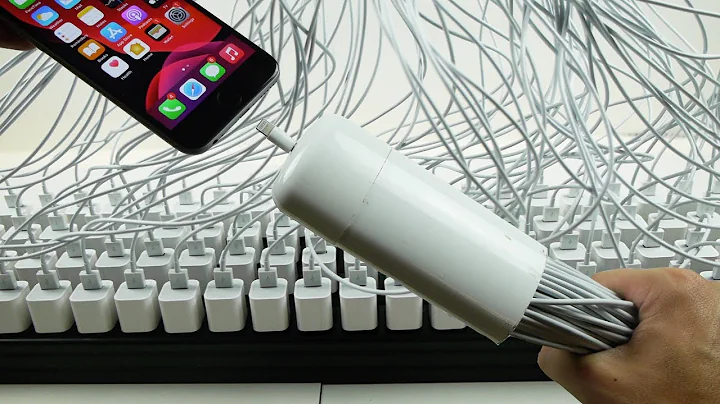Will a mobile phone charge faster if plugged into a USB 3.0 port
Solution 1
Generally no. Most phones will only charge at 500mA (about half of what a DC charger for a modern smartphone outputs) if it detects it is a USB port. The official standard sets USB 2.0 current levels at 500mA and 3.0 at 950mA. It is not uncommon for USB ports to support 1A or higher though, especially on laptops.
The problem lies with the phones. Some phones can use a modified kernel that allows you to tell the phone to ignore the 500mA limit on USB. This is often known as USB fast charge. Without this, most phones will simply charge at 500mA regardless of the USB flavor you choose. I can't say for sure about the Galaxy Note 3, however, as it is the only device with an actual USB 3.0 interface. Theoretically this could charge at 950mA but I haven't seen anything to confirm it. Devices other than phones, who knows. It would depend on the device. You would have to test it and see.
Use your USB 3.0 ports for USB 3.0 devices and buy a charger for your phone. Or if you must, charge with USB but it will be much slower than a dedicated charger.
Solution 2
I've been trying to find an answer to the question at the top of this page, and so far have not found anyone who has actually measured things. Lots of people say "should" and "might" and "generally" but there is no actual answer. Having the equipment to do so, I did so.
I measured the voltage and current coming from my USB power source (more on that later) and used a relatively new Galaxy S4, and an S5, as my test units.
My S5 is drawing 1.79 A from the standard USB wall charger and standard (2.0) USB cable. The S5 is powered down during this test (obviously the internal smart-charge circuit is not powered down).
The short answer is that if your USB power source is capable of pumping the current into one of these devices, they will accept it. However, it also appears that the internal charging circuit is monitoring the source voltage as it goes along, and if it looks like the source is starting to current limit (evidenced by the voltage dropping, even slightly), it reduces the amount of current that it will demand for charging. This is NOT what people usually think is going on when you are recharging a battery.
There are a lot more details to my analysis, including intermediate results -- many of which are fascinating to me because I am a hardware geek (and EE and ham operator and experimenter) but probably not as interesting to someone who only wants to know the answer to the question at the top of this page.
The USB 3.0 port is not what makes my newer phone charge faster than its older brother. It seems to be the wall charger itself, as well as the phone being switched off, which allows the power manager (inside the phone) to provide 100% of the charging power to go to recharging the battery.
If anyone's interested in my measurement details, follow up here and I'll answer!
Dave
Solution 3
People say different things about charging currents on mobile phones because the charge depends on particular phone charging hardware, its battery capacity, and firmware that controls all this process. And every phone is designed by different design team, and can behave differently. It depends if the phone supports so-called USB "Battery Charging" (BC) specifications, with particular version, or not. Or even the recent "Power Delivery" (PD) specification. It obviously depends if the host port supports any of these advanced power options. Generally speaking, the port current that a phone can take out of a particular port is bounded by the phone itself, in accord with the above circumstances. If this host has an ordinary USB3 port, but the cable in use is USB2 cable, and the host port does not respond to BC handshakes, the phone will determine this, and will limit its consumption to about 480mA, a notch below the standard USB. This is required by USB specifications.
In short, even if the host USB port is 3.0/3.1 and can supply 900mA or even more, the phone will not take more than 500mA over a regular USB2 cable, unless the port (and the phone) both support BC and/or PD specifications.
Solution 4
As a general rule, connecting a smartphone to a USB 3.0 instead of 2.0 port, will not make it charge faster. That's because USB(s) on computers are not compatible with Qualcomm QuickCharge or any other proprietary implementations. Wall QC/fast chargers use custom voltages for D+ and D- pins to communicate with the android device to escalate the power, while the ports of computers can't put intermediate voltages, only 0s and 1s which should be as close as possible to 0V and 5V.
So even if you have the Windows software, the computer can't physically use the protocol. You can fake a fast wall charger, however, with specific devices or dongles, wich act as a man-in-the-middle, and take control of the data pins using custom voltages:
- QC2.0/QC3.0/MTK-PE Trigger USB Tester Induction Quick Charge Voltage Detector Current Capacity Power
- JUWEI QC2.0/3.0 Automatic USB Tester Voltage Ammeter Quick Charger Power Bank Voltage Trigger
- USB power meter/tester thread - YZXStudio, Power-Z and more. Formerly "YZXstudio devices discussion"
Note that forcing a USB port to draw more current than it's capable of, may cause issues. Some computers or notebooks, however, can yet feed several amperes over USB, because usually they have several ports, and the 0V and 5V pins of all of them are internally tied together so you can suck the juice of all of them over a single port.
Proprietary fast charging protocols and connectors, like QC or Apple Lighting, were designed when USB-C was not available yet, but now they were superseded by USB-C /Power Delivery /Thunderbolt 3 which obviously are newer, better and more recommended. Google is also pushing hardware manufacturers to use them.
Related videos on Youtube
WillNZ
Updated on September 18, 2022Comments
-
 WillNZ over 1 year
WillNZ over 1 yearWill a phone(or any device for that matter) charge faster if it is plugged into a USB 3.0 port compared to a USB 2.0 port?
I know to assist charging you can turn features off(with flight mode) or even turn the phone off but if you need the USB 3.0 port for a device like a hard drive that will actually benefit from a faster connection then will the phone be slower on the USB 2 port?
-
 Admin about 10 yearsYes you can if you have a Galaxy Note 3,the first phone to feature ugly new Micro USB 3.0 port.I don't think any other phone exists with this feature if does let me know.
Admin about 10 yearsYes you can if you have a Galaxy Note 3,the first phone to feature ugly new Micro USB 3.0 port.I don't think any other phone exists with this feature if does let me know. -
 Admin over 8 yearsThere are also some great answers here: superuser.com/questions/1000568/…
Admin over 8 yearsThere are also some great answers here: superuser.com/questions/1000568/…
-
-
Milos Petrovic over 9 yearsI am interested in how you made the measurements of the power draw?
-
SuperSafie over 9 yearsWhat about these USB cables that are only for power? (they charge the device but can't transfer data, the PC and phone don't detect each other). I tried one of this cables with a USB 3 port and the current is still 500mA, shouldn't the phone try to draw more power as it doesn't detect it is a USB port?
-
 Maarten Bodewes about 9 yearsIt's not clear to me if this result is for just a wall plug or also for PC's and laptops. Who would switch off his/her phone just for charging?
Maarten Bodewes about 9 yearsIt's not clear to me if this result is for just a wall plug or also for PC's and laptops. Who would switch off his/her phone just for charging? -
jiggunjer about 9 yearshow did you measure 500mA. also some devices can only fastcharge with a few charger brands.
-
user1686 about 6 yearsDon't new phones support USB Power Delivery?
-
Smeterlink about 6 years@grawity yes some do like Samsung Galaxy S8/S8+, Note 8, LG G6, Xiaomi Mi6, Pixel 2 and 2XL, and probably more on the way.




